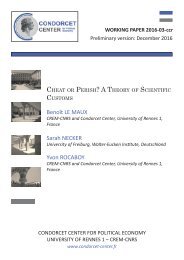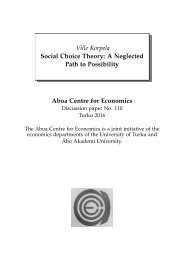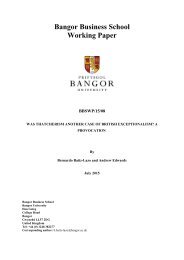MEMORANDUM
n?u=RePEc:hhs:osloec:2016_018&r=hpe
n?u=RePEc:hhs:osloec:2016_018&r=hpe
You also want an ePaper? Increase the reach of your titles
YUMPU automatically turns print PDFs into web optimized ePapers that Google loves.
Enchanted at Harvard<br />
Leontief’s passage from being research associate at NBER to becoming professor at<br />
Harvard happened quickly and smoothly. It may also seem surprising that it went so<br />
smoothly as Leontief after all had never held a university position and as he lacked<br />
Habilitation he was not even qualified for one in Germany, and he had never published<br />
anything in English. Leontief accepted an offer from Harvard in March 1932, less than<br />
half a year into his one-year contractual period with NBER. The offer was for an instructor<br />
position from the coming academic year 1932/33 but it came with extra benefits, a promise<br />
of an assistant professorship within a year, and prospects for even more. Even at Harvard,<br />
there was as in Kiel and at NBER uncertainty due to the financial crisis, but only a touch.<br />
The offer Leontief accepted initiated a period of more than forty years as a professor at<br />
Harvard. But even after accepting Harvard’s offer Leontief he had not burnt the bridges for<br />
a return to Germany.<br />
But how and why did he come to Harvard’s attention so soon after arriving in USA?<br />
Did Schumpeter play a role behind the scene? Why was Harvard so eager? In general there<br />
was a premium at leading American universities on talented economists from Europe. But<br />
were there more specific reasons for Harvard’s interest. Who provided the president of<br />
Harvard with an assessment of Leontief as a good prospect to buy into?<br />
With regard to how Leontief came to Harvard’s attention, a pertinent fact is that after<br />
two-three weeks in America Leontief traveled from New York to Cambridge and spent<br />
three days at Harvard University. He was certainly not invited by Harvard University and<br />
he hardly had any acquaintances among the economists there. He had been in<br />
correspondence (barely) with W.L. Crum, who impressed with Versuch and was one of his<br />
references for the position at NBER, and with Elizabeth Gilboy who had written a review<br />
paper about the methods of the Versuch treatise. But it seems remote that either of them<br />
could have been involved. More likely does it seem that Edwin Gay, co-director of<br />
research with Mitchell at NBER when Leontief arrived and also professor of economic<br />
history at Harvard, invited the bright new research associate for a brief visit to Harvard.<br />
From Leontief’s account to Schumpeter of his meeting with Harvard in the beginning<br />
of October 1931 he was almost overwhelmed by the welcoming gestures he received from<br />
the new tribe he had become acquainted with. He seemed quite intrigued by the cordiality<br />
he was met with. Leontief’s observations of and reactions to Harvard were conveyed in<br />
letters to Schumpeter in Bonn from October 1931 to April 1932. On his return to New<br />
York from Harvard he wrote to Schumpeter: “All the economists are exceptionally kind to<br />
79





